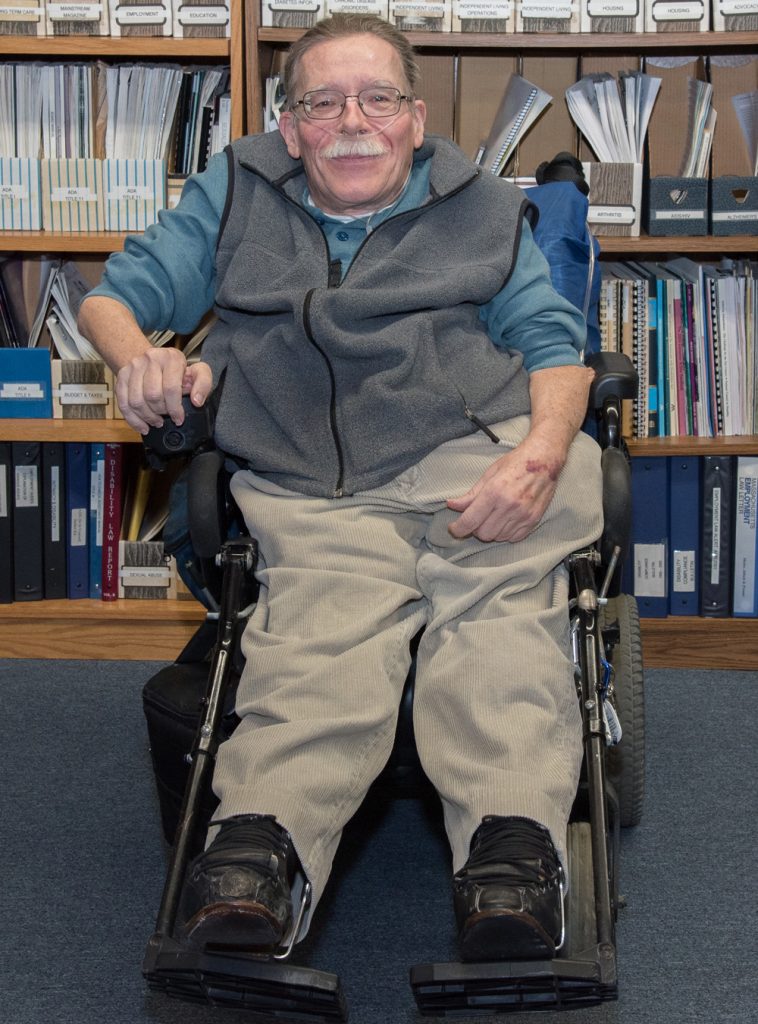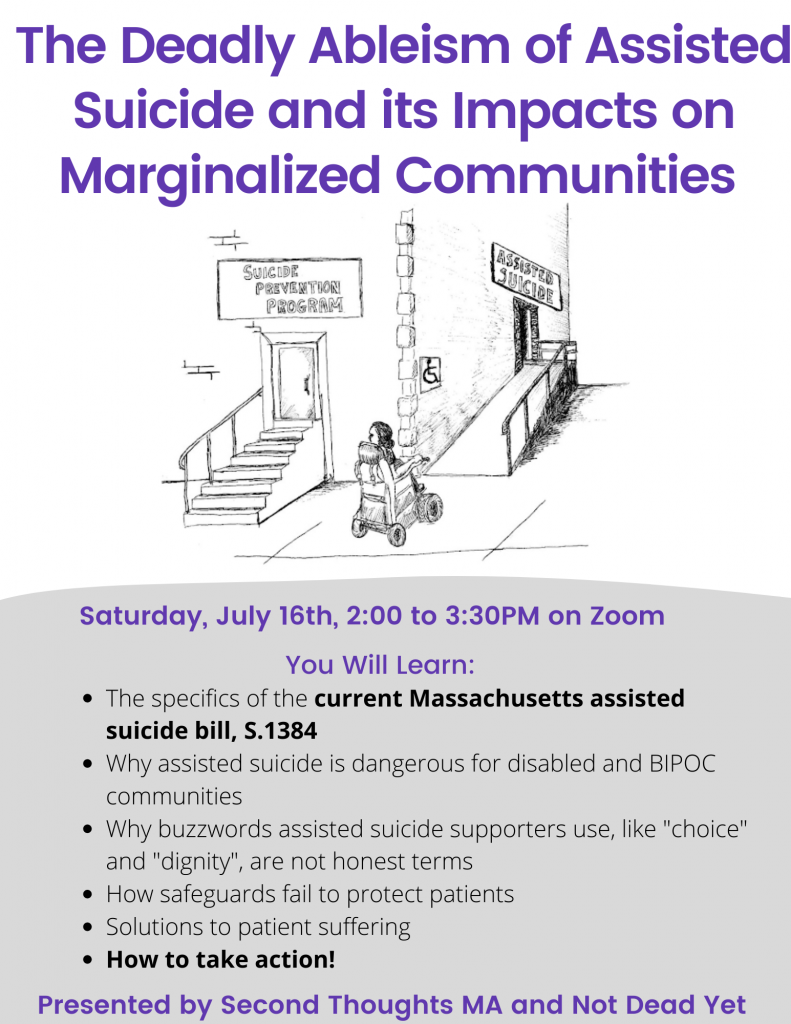Click here for a PDF image scan of the article and the page it appears on in the Quincy Sun. The full, screen reader accessible text of the article is below.]
by John B. Kelly for The Quincy Sun, August 18, 2022
38 years ago an accident left me paralyzed below my shoulders. My father was brokenhearted and wished I had died instead. His hopelessness about my life, however painful for me, was but a simple reflection of widespread prejudice against disabled people.
A few years after my injury, Jack Kevorkian became a sort of folk hero for “helping” terminally ill people die through his “self deliverance” machine. It later came out that more than two thirds of his clients were not terminal at all, but disabled people, primarily women, in psychological distress.
Over time, as medicine has focused increasingly on patient “quality-of-life” as a barometer of life-worthiness, death has been recharacterized as a benefit to an ill or disabled individual. Most physicians (82%, a Harvard study recently found) view our “quality-of-life” as worse. Disability advocates have raised concerns about the fate of disabled people like Oregonian Sarah McSweeney and Texan Michael Hickson. Both wanted to live, both were loved by family and caregivers, but they died after hospital personnel denied them treatment based on their disabilities.
Over the last 25 years first Oregon, then additional states and Washington DC established assisted suicide programs for people expected to die within six months. Proponent rhetoric has focused on compassion for people’s physical pain and suffering, and the hope of a choiceful, peaceful end.
The reality, as shown by the top five reported “end of life concerns” in Oregon, hinge not on pain, but on people’s “existential distress,” as one study termed it, in reaction to the disabling features of their illness: depending on and feeling like a burden on other people, losing abilities, losing the respect of self and others (“loss of dignity”), and shame over incontinence.
Prominent bioethicist Thaddeus Pope concedes that “Everybody who’s using medical aid in dying is disabled. And probably you could go to the next step and say the reason they want medical aid in dying is because of their disability.” To Pope, any disability a patient finds “personally intolerable” is sufficient reason to assist their suicide.
In Massachusetts, assisted suicide bills have been put forward every session for the last 20 years. Proponents proclaim strong public support for the measure, but that support is shallow. In the weeks leading up to the 2012 ballot question on assisted suicide, polls showed 64% support.* The ballot question lost, 51%-49%. Now supporters say that 77% of Massachusetts residents support the bill, based on a poll question seeking compassion for terminally ill people “to end their suffering,” with its implication of physical pain.
State House Speaker Ron Mariano declared “We have a very divided House of Representatives. There’s not a 77 percent affirmative vote in the House right now.”
With the end of the legislative session on July 31, the bill died.
Disability rights advocates appreciate the willingness of many legislators to take our concerns seriously. We worry, with death reframed as a benefit for severely disabled people, that increased legalization will bring expansion of eligibility. Pope points out that the US is unique in the world for limiting assisted suicide to terminal people, and that every other jurisdiction, including Canada, offers euthanasia on demand to non-dying disabled people. He predicts that non-terminal disabled people will become eligible in the US. In Canada, disabled people have been euthanized because they were denied needed care or couldn’t find safe housing for multiple chemical sensitivities.
There are unsolvable problems with all assisted suicide laws. First, real choice resides with insurers, whose bottom line favors delay or denial of treatment. Dr. Brian Callister reported trying to refer two patients for life-saving but expensive procedures in Oregon and California, only to hear that the insurers limited coverage to hospice and assisted suicide.
Second, when people feel they have lost their dignity and feel like a burden on others, they are vulnerable to pressure and outright coercion to sacrifice themselves for others benefit. Abuse yearly affects one in 10 elders, exacerbated by COVID-19 restrictions. A self-interested heir can push a patient to make the request, serve as a witness along with a “friend,” pick up the drugs and, because no disinterested witness is required at the death, administer the drugs themselves. The law grants immunity to anyone who assists in the death who say they acted “in good faith.” Deadly abuse goes unpunished and unnoticed.
Third, terminal prognoses are notoriously inaccurate. NPR reported a few years ago that nearly one in five people who enter hospice survive the six-month benefit. Oregon revealed last year that just 4% of patients live past six months, meaning that the difference between 4% and almost 20% represents the body count of people who weren’t really dying. People who oppose capital punishment because of the inevitability of executing an innocent person should take note.
The 2012 Massachusetts ballot results and the patient demographics in states like California show there is a social class, race, and ethnicity component in the use of and support for assisted suicide. A 2013 Pew Research Center study showed that Blacks oppose assisted suicide by 65%-29%, and Latinos by 65%-32%. Majority Latino Lawrence voted 69% against the 2012 question, while white working class towns like Taunton and Gardner also opposed. Wealthier, whiter Massachusetts towns voted heavily in favor. In California, 94% of reported assisted suicides have been by non-Hispanic whites, more than twice the group’s share of the state population. Almost no black people have used the program.
The answer is to address people’s real needs. That means a fully funded Medicare home care benefit to reduce burden and keep people out of nursing homes. It means more and better palliative care. And for people whose discomfort cannot be otherwise relieved, there is the option of palliative sedation, whereby a person is sedated to the point of comfort while the dying process takes place.
The answer is not medically assisted suicide. We disabled people demand full civil and human rights, equal protection under the law, equal suicide prevention, and more respect throughout society.
John B. Kelly is the director of Second Thoughts MA
*Note to readers: in the hardcopy version of this essay, John Kelly wrote that polls showed 68% support for the 2012 Ballot Question 2 weeks before the election. The relevant Suffolk University poll, however, taken September 17, 2012, shows that support at 64%. We made the change to the accurate number.
Read The Answer Is Not Medically Assisted Suicide – Disabled People Demand Full Civil, Human Rights.
Not Dead Yet also published the article.


